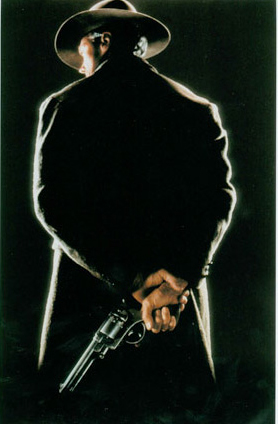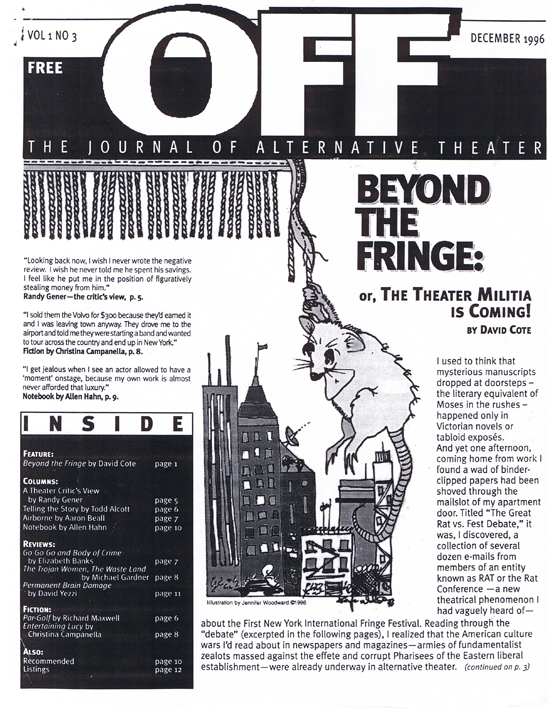Zines Once Carried Our Memes
 Scott has established a new “code of ethics” for posting and commenting within his domain. His call for Law and Order reminds of certain memes traceable back to the Old West that are embedded deep within our American character. Reminiscent of how the infamous Earp brothers once banned all six-guns and other firearms from entering the city limits of Tombstone, Scott stipulates that bloggers check their “virtual fisticuffs” at the door to Theatre Ideas. The townsfolk, especially womenfolk bloggers like Laura, will find safe haven from the lawlessness and verbal violence of the Theatrosphere.
Scott has established a new “code of ethics” for posting and commenting within his domain. His call for Law and Order reminds of certain memes traceable back to the Old West that are embedded deep within our American character. Reminiscent of how the infamous Earp brothers once banned all six-guns and other firearms from entering the city limits of Tombstone, Scott stipulates that bloggers check their “virtual fisticuffs” at the door to Theatre Ideas. The townsfolk, especially womenfolk bloggers like Laura, will find safe haven from the lawlessness and verbal violence of the Theatrosphere.
In historical retrospect we know that many of the urban v. rural and North v. South tensions of the American Civil War were still erupting during the Tombstone era in 1880. Interesting how this is only slightly different in species from the New York v. Hinterland and Red v. Blue state arguments currently being hosted in the Theatrosphere. Memes don’t die as readily as they mutate.
I am in alliance with most of Scott Walters’ ideas on theatre. If he sensed this about me, my harsh critique of him as part of my previous post was probably felt as a betrayal. I have been trying to write some second thoughts about my characterization and his reaction, but I am too slow at posting and commenting, Scott keeps preempting everything I write. So I post the following now to catch-up with our conversation, although he has been writing it all quite well without my help (irritant). I’ll insert his preemptions where I think they belong.
The discussion as I see it is about blogging for theatre, the nature and function of the new theatre talk in the theatrosphere and its relationship to the practice of the art form.
SCOTT SAYS: I am curious if you could give an example of a post “tinged with that patronizing posture of “the teacher.†Not that I don’t believe you — I suspect all of our writing styles reflect our professions — but it would help me understand better if I had an example. I’d also be curious how my writing is more lecture than dialogue than, say, David Cote or Clyde Fitch or George Hunka. I suspect you are reading a tone into my posts.
NICK SAYS: As artistic director of Thieves Theatre and solo artist, I have a long history of polemic work. Consequently my battle with the press bunkers has been what seems like forever. So I don’t much like the newsboys. I read them only with extreme prejudice. I am warming up to David Cote and Leonard Jacobs because of their blog writing and comments in the theatrosphere, their attempts toward this new dialogue of theatre talk. As for George Hunka, he just got busted by Malachy Walsh for his “the-ah-t-ah” writings, with the hat tip going to the chuckler, Don Hall. The unaffected personal blogging styles of Malachy and Don, with equal parts life and art, are one of those unique rich segments of the theatrosphere that print publication could never even imagine.
The blogosphere is a radical departure for publication. Print publication has been much like the teacher’s lecture to the students, so you’re right, it was unfair of me to single you out as “the teacher.“ In most ways you are essentially no different than the three bloggers you name. You are all writing from the print model in which you have been trained. Old habits die hard.
My diehard habit is slightly different. I cut my teeth writing under pseudonyms in the zine scene of the ‘80’s, early ‘90’s. The zines I wrote and distributed through the early network of the rat conference I later reformatted into RAPT, rat’s first e-zine and web pages. This was in 1996 at the very beginning of the World Wide Web. Most believe that the widespread adoption of web browsers beginning in 1996 marked the transition from the print zine to the virtual zine era. And nth generations later we have the blogosphere.
For an interesing tidbit of history at this transition point, a blast from the past giving additional context to the current subject, read “zinester” David Cote more than ten years ago in his self-published OFF:Journal of Alternative Theatre as he argues his New York centric stance with the pseudonymous BenTrovato of Thieves Theatre. The occasion is the simultaneously approaching NYC rat confererence and first New York Fringe Festival where David presents an edited version of the Great Rat v. Fest Debate excerpted from the early rat web pages. Here is Brooklyn-based Ben Trovato in a letter to the editor of OFF calling David to task on his New Yorky bias.
I love the chutzpa of six xerox pieces of paper and a staple calling itself “The Journal of Alternative Theater”. Why not? A vital journal, like vital theater, is not a function of production cost or institutional affiliation. The non-organization of theaters from around the country known as RAT (Raggedy-Ass Theater), was created in a similar spirit of rough need and fullfillment.
Perhaps he (Cote), too, has an agenda. There’s surely a hint of one when he says “For some of us, it’s self-evident that the best art will happen in the best cities. And, though the consensus is ebbs and flows on this, the best city is New York.” It is this kind of (stereotypically NY) chauvinism that RAT is trying to dispel in its linking of like-minded alternative theater workers in cities around the country and the world.

NICK SAYS: Scott, you don’t seem quite the academic, but I imagine it’s where at least some of your reading is. So your model of writing would be drawn from there also. In a certain way, academics do dialogue with one another in journals. But much of this juried jargon has always been ineffective outside its clique, and today it’s becoming even more isolated and irrelevant as the new internet models of publication/dialogue continue to proliferate.
SCOTT SAYS: To my mind, academia ought to be the R & D for the theatre. We should be trying things out, coming up with ideas, documenting performances, and spreading the word about what is new and exciting. And we should be putting this into readable, accessible forms so that the exhausted artist can grasp the ideas easily (as opposed to the jargon and obscurity in academic journals, for instance). To me, blogging is a great way to do that.
I want to be upfront about any ideas I post in the future: I am a teacher, not an artist. I am a teacher who does theatre, not a theatre artist who teaches. I am a teacher by choice, not by accident. I am not a “frustrated artist” who “fell back on” education….As someone noted, I often give what he called “advice to the players,” by which I mean that I come up with suggestions for different ways to do things. I’m not going to go out and do them myself, which I suppose might seem a bit duplicitous. So let me explain how I justify giving advice to artists trying to actually make a living in the theatre…
(Follow Scott as he practices his new code and advisory role at Theatre Ideas.)